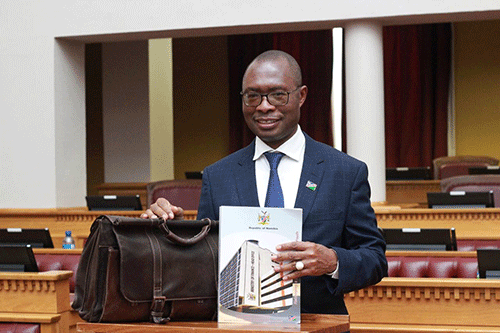Finance minister Iipumbu Shiimi said government remains committed to improving the socio-economic condition of Namibians and will continue to support vulnerable members of society given the availability of resources and as the global, regional and domestic economic situations improve.
He made these remarks on Tuesday in the National Assembly (NA) when responding to questions, comments and matters raised during the second reading of the 2022/23 mid-year budget policy review and medium-term budget fiscal policy statement for the 2023/24 to 2025/26 medium term expenditure framework (MTEF).
Allocation towards youth and social sector
One of the concerns raised in the NA is that the mid-term budget failed to address the plight of the youth and vulnerable members of society.
Responding to the matter, Shiimi said the youth matters are cross cutting and are addressed across many sectors of the society.
“Loan schemes are made available at the Development Bank of Namibia (DBN) to assist business-minded youth to set up their ventures and improve their living conditions. We understand therefore that more needs to be done and government will continue with various initiatives to support the youth,” he said.
According to the midterm review statement Shiimi presented in parliament last month, some N$5.2 million was included in the budget of the social welfare ministry to increase the monthly Conditional Income Grant (CIG) for former food bank recipients from N$500 to N$600, effective October 2022. In addition, funding of N$97 million was incorporated to increase the disability grant for beneficiaries under the age of 18 from N$250 to N$1 300 as of the next financial year.
Cognisant of the cost-of-living pressures, a further provision had been made to increase the monthly old age grant and the disability grant as well as the orphan and vulnerable children’s grant by N$100, effective from the start of the next financial year.
Government debt
Addressing concerns regarding government debt, the finance minister noted government introduced a policy of fiscal consolidation and a tight budget to ensure the debt situation is brought under control. He added there are other measures and reforms to grow and diversify the economy, including curbing unnecessary expenditure.
In addition, he pointed out that N$9.1 billion is geared toward debt servicing which is allocated for under the finance ministry.
Namibia’s public debt stock is expected to increase to N$138.4 billion, equivalent to 69.6% of GDP, during the current financial year.
SMEs sector
Moreover, government believes in the role the small and medium enterprises (SMEs) play in the economy and job creation. Shiimi also mentioned SMEs schemes run by DBN and Bank of Namibia (BoN) respectively, for which government provides the necessary capital.
Unfortunately, he stated these schemes are not efficiently utilised by SMEs.
“The ministry, in collaboration with the two institutions mentioned above, assessed and reached out to SMEs and financial institutions participating in these schemes, to identify what are the bottlenecks that are stopping SMEs from utilising these facilities and we are looking at redesigning these schemes as well as creating awareness to increase SMEs participation in the schemes. The government is further exploring means to increase the support to SMEs as resources become available,” the minister explained.
Furthermore, Shiimi stated N$40 million was allocated toward green schemes in FY2022/23 to revive production activities while the land leasing process unfolds.
PSEMAS
Explaining the N$1 billion reduction in Public Service Employees Medical Aid Scheme (PSEMAS), Shiimi noted the essence of the reduction is to capture expected gains from envisaged reforms to the overall benefit structure of the scheme.
According to him, the current scheme is marred by exploitation by service providers that result in government losing money. Shiimi added government is currently working on further reforms to ensure these loopholes are eliminated and the administration of the fund is improved.
“Similar to other medical schemes in the country, it is important to ensure that the benefit structure of PSEMAS is optimally managed. These efforts could free up resources that could be used to improve service delivery at public hospitals which the majority of the Namibian people use,” said the finance minister.


